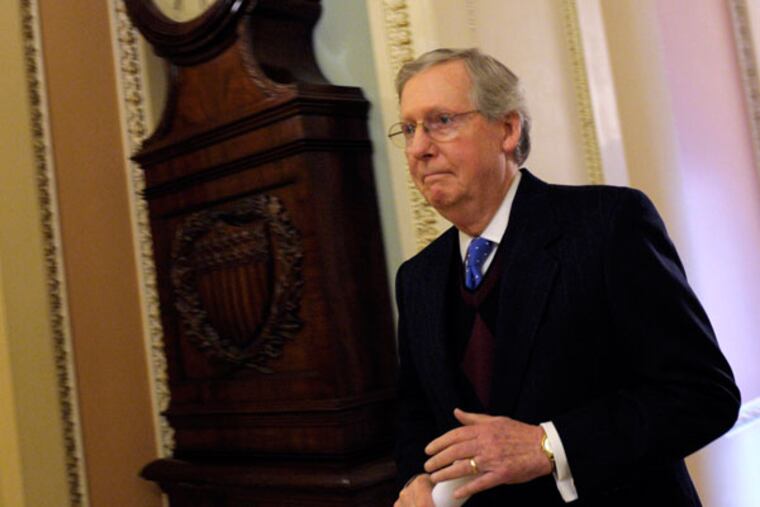Waiting: For lawmakers, nothing to do just yet.
WASHINGTON - Inside the silent House chambers, every seat was empty. The wooden doors leading to the galleries, where the public and press watch laws get made, were closed.

WASHINGTON - Inside the silent House chambers, every seat was empty. The wooden doors leading to the galleries, where the public and press watch laws get made, were closed.
As the country lurches ever closer to the fiscal cliff Jan. 1, the only debate to be heard inside the U.S. House of Representatives on Thursday was via a television showing C-SPAN, which replayed video from a Nov. 20 conference on, perhaps appropriately, "Debt Crises and the World Economy."
With Christmas over and the cliff still looming, House members were still scattered across the country. Senators trickled back to Washington, but had no proposals before them to avert the roughly $500 billion of tax hikes and budget cuts set to hit Tuesday.
When it comes to the most pressing issue facing the country, most members of Congress, including those who represent the Philadelphia region, are in the same position as everyday Americans: watching and waiting.
Since Election Day, the talks to avert the cliff have been concentrated at the very top of the political hierarchy, leaving most lawmakers to simply wait for a deal that they can vote up or down, aides have said over recent weeks, and again Thursday.
President Obama and House Speaker John A. Boehner (R., Ohio) hold the keys to any deal. Senate Majority Leader Harry Reid (D., Nev.) and the House and Senate minority leaders, Nancy Pelosi (D., Calif.) and Mitch McConnell (R., Ky.), have a say as well. For the most part, other lawmakers are on the outside looking in, at least until there is a vote brought forward - which likely won't happen without some kind of agreement.
"It's frustrating that there are politics being played on both ends of the spectrum on this issue," said Rep. Pat Meehan (R., Pa.). "But we have to get to legislation that will pass both the House and the Senate that the president will sign."
"The posture I think everybody's in right now is waiting to see what the president proposes and waiting to see what Speaker Boehner" will agree to, said Sen. Bob Casey (D., Pa.).
Waiting to see. So it went Thursday for the region's representatives and their staffs. One top aide shopped for the ingredients for antipasto for a New Year's party. One congressman spent time with an elderly loved one. And New Jersey's senators kept pressing for passage of the Sandy relief bill.
Meehan was one of the few Congress members in Washington for the day. He was working with his staff on preparations to become chairman of the House subcommittee on cybersecurity, which he will oversee in the new session of Congress.
"For me, personally, it is frustrating," Meehan said. "I wanted to see a resolution."
Before Christmas, the congressman from Delaware County had been ready to back Boehner's plan to allow taxes to rise on incomes of $1 million and more - but that proposal was scuttled by antitax House Republicans late on Dec. 20.
"I was prepared to support the vote," Meehan said Thursday in an interview.
Instead, the House left Washington and has not returned. Members are scheduled to come back Sunday. Hoping to give them something to vote on, Obama, who jetted back early from his Hawaii vacation, has scheduled a meeting with congressional leaders Friday at the White House.
Meanwhile, the Senate on Thursday debated a bill on intelligence surveillance, and expected to vote as soon as Friday on the relief bill for Hurricane Sandy.
With hopes fading for a fiscal cliff deal, discourse centered - as it often does - on who is most at fault. On the Senate floor, Reid suggested Boehner was more concerned with staying speaker than reaching a deal, and chastised House members for being "out watching movies and watching their kids play soccer and basketball." McConnell, for his part, said the Democrats haven't come up with a plan that both parties can support.
Republicans, who control the House, blamed the Senate, where Democrats rule, for refusing to take up a bill the House had passed over the summer to extend current tax rates for all Americans and to avert automatic cuts to defense programs.
"It is the responsibility of the Senate to act now on the bills that are before them," Meehan said. "If they do not like what is before them, then amend them and send them back to the House."
Senate Democrats pointed to their own bill, which would extend tax rates for incomes less than $250,000, allowing taxes to rise above that amount.
"If the House came back into session tomorrow, it could quickly pass the tax cut bill we sent them in July," Casey said. "Republican House members have been saying over and over for years that they support tax cuts for middle-income people. They could prove it by passing this bill."
The House and Senate solutions, though, were each passed unilaterally. For a deal to get done, leaders on each side need to agree.
That means local elected officials may have the best seats in the House, but for now they are still largely spectators.